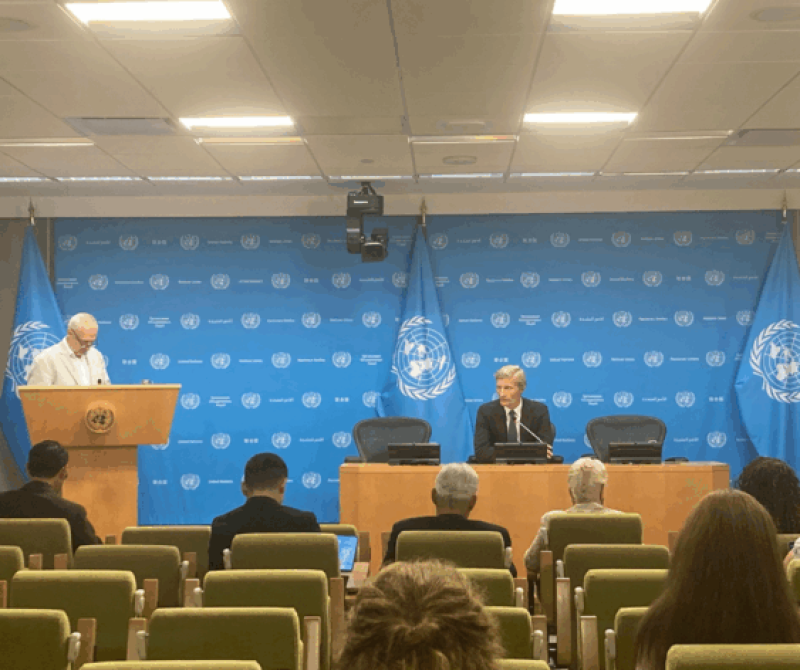- Puppet show enchants Children as Boi Mela comes alive on day 2 |
- DSCC Admin Salam’s drive to make South Dhaka a ‘clean city’ |
- 274 Taliban Dead, 55 Pakistan Troops Killed |
- Now 'open war' with Afghanistan after latest strikes |
- Dhaka's air quality fourth worst in world on Friday morning |
WFP Deputy Chief Warns of Deepening Crisis in Gaza

Carl Skau, Deputy Executive Director of World Food Programme (WFP) briefs media at the UN.
Carl Skau, Deputy Executive Director of the World Food Programme (WFP), described the dire humanitarian situation in Gaza following his recent visit, during a press briefing at the UN Headquarters on 11 July.
“The situation is worse than I’ve ever seen it before,” he said. Skau has visited Gaza four times since the war with Israel began.
He highlighted desperate humanitarian needs, particularly widespread starvation, and noted that WFP’s ability to respond has “never been more constrained.”
An Integrated Food Security Phase Classification (IPC) report published in May found that half a million people were starving in Gaza. It projected that the region would remain at Emergency level from 11 May through the end of September 2025. Skau added that conditions have worsened since the report’s release.
Recent UNICEF data revealed that malnutrition is widespread, with 5,119 children aged 6 months to 5 years treated for acute malnutrition in May—a 50% increase from April. Basic commodity prices have skyrocketed. During Skau’s visit, a kilogram of wheat flour was priced at USD 25. Often, people survive on nothing more than hot soup with a few lentils or pasta.
Skau also met with families who had been displaced multiple times in just 10 days—some as many as 30 times since the conflict began. With each move, they are able to carry fewer belongings needed for survival.
“The fact that people are now dying every day trying to get food is the starkest demonstration of how desperate the situation is,” he said.
He also reported that WFP teams are struggling. They can only deliver a fraction of what is needed. Delays at checkpoints and clearance procedures force them to wait 15–20 hours. Skau criticised the Israel Defense Forces (IDF) for obstructing humanitarian deliveries, stating it is “unacceptable.” Some Israeli officials reportedly agreed that the UN must be allowed to operate freely in the region.
On 11 July, the WFP managed to deliver aid to northern Gaza for the first time in several days—an area Skau described as a more orderly route for food distribution.
However, WFP vehicles are low on fuel and spare parts. Many of their armoured vehicles have damaged windows, and their communication range is limited to just 20 metres.
The team is under immense pressure and unable to supply the amount and variety of food typically required for a crisis of this scale.
“Our national staff, living amid this crisis, are the true heroes—getting up every day and doing their work,” Skau said.
During the 42-day ceasefire, the WFP opened 25 bakeries, hundreds of soup kitchens, brought in over 8,000 trucks, delivered food packages to more than 1.5 million people, and stocked warehouses—allowing operations to continue during the blockade.
Skau emphasised that a ceasefire is “urgent” for any meaningful humanitarian improvement. He called for the reopening of all entry routes into Gaza and daily truck access. Half of the aid, he said, should be directed to the north to stabilise the situation and reduce food prices.
Currently, none of the WFP bakeries are operational due to the extreme desperation. The WFP is also unable to supply fresh produce, which depends on the private sector. Skau reported not seeing any open markets during his visit.
The northern Gaza beach is now covered in tents. Women in the encampments described a deeply “disheartening” experience. “They’re telling their kids not to play to conserve energy,” he said. “They also spoke about the frustration and anger their husbands and sons are feeling—waiting in queues at soup kitchens, sometimes returning with nothing.”

